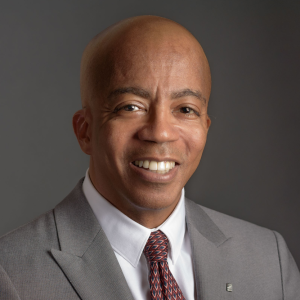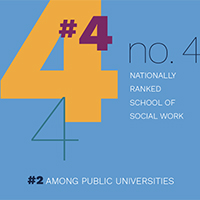by Barbara Wiedemann
Dr. Hawkins, you grew up in Henderson, North Carolina, a small town about 50 miles northeast of Chapel Hill. Tell us about the educational path that led first to Appalachian State University in Boone.
When I grew up, my family was pretty poor. My Dad was a brick mason, but his work was not very reliable. My mother worked in fields until I started school, and then did factory work. I can’t think of anything that grows that my mother didn’t pick. Some of my first memories are of being in the field with my mother and sisters while she picked cotton and tobacco. I have six living siblings: five sisters and one brother. One sister passed away when I was a toddler. My brother was too young to remember, but my sisters and I still sometimes talk about our tobacco barn days.
Henderson is a small rural community. As a child, there was no expectation that I would ever go to college. It wasn’t on my radar. No one close to me had plans to go to college or even knew much about it. There were only a handful of African-American kids in school thinking about it. And most of those were hoping for sports scholarships.
At some point in high school, my friend group shifted. I started hanging out with kids who were more aspirational, who were dreamers like me. I had an 11th grade teacher who asked why I was in her basic English class. I remember lots of disagreement with the high school counselor over whether or not I could move into college prep, and my teacher helped guide me to those advanced courses — but only in my senior year.
Looking back, it seems obvious that after high school, I should have enrolled in community college and moved to a university from there. But I was ignorant of how college worked. When no one thinks you are going to college, they don’t exactly talk about it. I knew that I didn’t meet some of the requirements for universities closer to home, but I called Appalachian State largely because they were the first on a list I had of schools in North Carolina. I worked directly with their admissions office, who guided me through my application. I ended up getting accepted and had to test my way out of remedial English class and take a beginning math class to catch up.
College opened up a whole new world for me.
At the same time, I struggled psychologically at App State. Everything was so new and at the time I was really in a super-minority. There were only a handful of students of color there. Because of my youth and inexperience, and my struggle to fit in, I really didn’t absorb everything I needed to absorb. But I was determined to succeed. And I did!
What led you back to North Carolina’s UNC School of Government and then to Brandeis University in the Boston area?
When I graduated with my bachelor’s degree, I laughed and thought “No way. I am never doing anything like this again.”
I moved to New York City with the $98 I had to my name and lived with my aunt in Long Island for a short time. She told me, “You can only be here for three months.” That was daunting. But New York City is the place that reshaped my life. Living in NYC, being exposed to all these different people and ideas, had an impact that would forever change my life.
It was a struggle financially, but I had to keep pushing. If I failed there was no safety net to catch me.
Fortunately, I was successful. I decided to come back to North Carolina for my graduate degree in public administration. That’s when I was introduced to social work because I took classes at the School of Social Work, and after graduating, I worked with CARES and the Family and Children Resource Program as well.
At that time, which must have been around 1992, I took a class with UNC School of Social Work Dean John Turner. He was the first Black person I ever met who had a doctorate. I know it’s hard to believe. I was in my mid-20s and had graduated from a four-year institution.
Here was a lovely and brilliant man who had accomplished so much in his life, a person who I really felt was a role model. And he was willing to take the time to guide and mentor me. Knowing him made me think about what I wanted to accomplish in life. Being connected to Dean Turner and the school made me think more about my interest in equity and social justice — although we didn’t call it that back then.
The part of social work that I felt most connected with centered around policy issues and social welfare. I talked to Dean Turner about it, and he thought that made sense for me. He knew I wasn’t interested in clinical practice. He suggested and eventually wrote one of my recommendations for Brandeis University, where I earned my master’s and doctoral degrees in social welfare policy and social policy, respectively.
He made me believe that I could get a Ph.D. I was terrified, but his belief in me meant a lot. It wasn’t “If he could do it, I could do it.” It was more that he gave me hope that I could do it. But I also want to add that Dean Turner was not the only one. There were so many others at the School who inspired me: Mary Anne Salmon who was with CARES at the time, former Deans Richard Edwards and Gary Bowen, Maeda Galinsky, Iris Carlton-LaNey and others really were among those who inspired me.
You eventually spent 18 years at the Silver School of Social Work at New York University. Your last role there was as associate dean for academic and faculty affairs, which is also your current position at NC State University’s College of Humanities and Social Sciences. How does that relate to this new role as Vice Dean at the UNC School of Social Work?
The role is somewhat similar and of course, I’ll learn much more about it after joining the UNC School of Social Work in July. I can see from the job description and my conversations with Dean Denby-Brinson and others whom I met during my colloquium at the School in February that my experience at the Silver School of Social Work and at the College of Humanities and Social Sciences will be helpful to me on the job at Carolina.
Those responsibilities include CSWE reaffirmation, curriculum development and regulations, working with the School’s on-ground and online MSW programs, and its Ph.D. program, among other things. I have been directly or indirectly involved in all facets of social work higher education throughout my career. That said, this role probably bears more responsibility, and more visibility. It is a role I welcome.
There is an excitement about the innovation that the School is investing in with this new position of vice dean. Many of my responsibilities will be in areas that I have touched on in previous roles. But this newness invites creativity. People are doing really important work at the School, are dedicated to social justice, and are very engaged with the community. I look forward to working with my colleagues and the School’s partners to “think outside the box” about how to have an impact as social workers and researchers at the state, national and global levels.
My vision for this role includes: maintaining excellence and building resources to make the School No. 1 in the U.S.; approaching faculty and staff success in the same way we approach student success — with an eye on impact; increasing access to social work education; continuing to expand the School’s global reach and engagement; and supporting, advancing and advocating for diversity, equity and inclusion and anti-racism.
I am extremely impressed that the recent U.S. News and World Report ranks the School No. 4 in the nation and No. 2 among public universities. Rankings can be a source of pride, even as they do not reflect everything a school is or what they can offer. But what I know about the UNC School of Social Work is that it has a reputation for excellence at every level of operation. I am so very pleased to now be a part of that excellence.
What does it mean to say your research lies at the intersection of poverty, race and policy?
You could also add “culture and identity” to that list.
My research applies a community-focused and collaborative approach. I look at the lives of those who live on the economic margins. Much of my research has been about answering this question: How do you transition from poverty to economic sustainability? In some ways, you could say I research myself.
Some examples are a three-year ethnographic study of poverty, social capital and ontological security in New Orleans post-Katrina; an ethnographic collaborative in the Philippines that focuses on women’s health and mental health; and research that centers on optimizing increased COVID-19 testing for Black and Latino/Hispanic frontline essential workers in New York City. I often ask the same questions: What can we do so that people who don’t have resources get access to resources? How do people in communities that have been marginalized find the internal and external resources that can facilitate their physical, psychological, and economic well-being?
We use a lot of theory in thinking about how to get there, including theories of social capital. That is when I look at my own life and think about the connections I have made. Not just who I know, but how I have benefited from those relationships.
I also can see that I have had tremendous opportunities. I have been exposed to things that a little boy from Henderson who didn’t have running water and worked with his mom and sisters in tobacco fields could not have ever dreamed of. I have been fortunate in so many ways.
But I’ve also experienced tremendous injustice. Both can exist in the same body. What I’d like to do is to give others access to some of the opportunities I had. But try to reduce the number of injustices they experience.
Some of this thinking started at UNC. When I was a student here (Professor Emeritus) Mark Fraser wrote about resilience and social capital. I used some of his work to develop my own ideas about these concepts in my dissertation. UNC School of Social Work never left my mind. It has touched all my work in so many ways!
Related stories
Robert L. Hawkins, Ph.D., has been named to the new position of vice dean at the University of North Carolina at Chapel Hill School of Social Work, effective July 1.
The School of Social Work moved up three spots in the latest U.S. News & World Report “Best Graduate Schools” rankings, rising to a tie for fourth in the nation.



